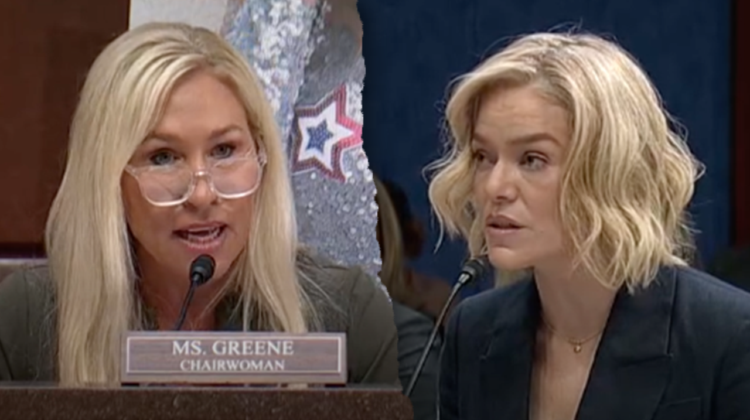
[Want even more content from FPM? Sign up for FPM+ to unlock exclusive series, virtual town-halls with our authors, and more—now for just $3.99/month. Click here to sign up.]
Among the media institutions captured by Progressives in the last half-century or more, and turned into what Rep. Marjorie Taylor Greene last week called “radical left-wing echo chambers,” are National Public Radio (NPR) and the Public Broadcasting Service (PBS). Both of these came under intense scrutiny in Department of Government Efficiency (DOGE) hearings last week as Republican lawmakers exposed and humiliated the networks’ leadership for their taxpayer-funded, blatant political bias.
NPR CEO Katherine Maher, most notably, had the nerve to claim something no NPR listener alive could honestly believe, which is that her network delivered “unbiased, nonpartisan, fact-based reporting to Americans.” The committee countered her with the embarrassing revelation that the NPR editorial staff consists of 87 registered Democrats and a grand total of zero registered Republicans.
The lawmakers proceeded to present Maher with years’ worth of a damning litany of her social media posts reflecting the most extreme Left-wing, virtue-signaling perspectives, from support for slavery reparations to denouncing “whiteness” to promoting gender ideology and the use of personal pronouns.
It was stunning to watch her attempt to defend herself by alternately either lying (“I have never said that”), feigning ignorance (“I don’t believe that I read that book”), or backtracking (“I believe much of my thinking has evolved over the last half-decade.”) in response.
She was also overwhelmed by Republican Rep. Brandon Gill’s citations of far-Left editorials at NPR, claiming ignorance again: “I’m not on the editorial side, so…”
With the advent of the Trump administration, Republican leaders are finally finding the backbone to call out the Progressive activists who dominate public broadcasting and to take action on the GOP’s long-standing but previously toothless threat to pull federal funding from these Left-wing echo chambers – a move President Trump himself favors. “It’s a very biased view, you know that better than anybody,” he told a reporter at the White House on Tuesday, prior to the hearings, “and I’d be honored to see it end.”
That bias extends almost as far back as the very founding of these networks at the beginning of the 1970s, as anyone old enough can attest. Remember Left-wing propagandist Bill Moyers? Moyers was literally a key player in the very creation of the public broadcasting system. His first PBS series, This Week with Bill Moyers, began airing in 1971. NPR too began broadcasting that same year, at a time when America had already been sharply divided for years by the Vietnam anti-war movement, and the Left saw the opportunity to take to the airwaves, assisted by government funding, to foment subversion and push Progressive causes.
Indeed, the Left-wing bias at public broadcasting swiftly became so normalized over the decades that the intensifying of activism and propaganda in recent years makes the bias seem new, to some. On Friday, journalist Matt Taibi published a timeline of the NPR/PBS funding debate. In it he noted that former NPR editor Uri Berliner helped drive scrutiny of the network with an April 2024 essay about its lack of viewpoint diversity. The critical essay resonated with Taibbi, who also had become
increasingly disillusioned with NPR. For years, I used to say that I would have left journalism if it weren’t for public radio. It was the truth. NPR was a place for conversations with people of diverse viewpoints and, of course, rich storytelling. As Berliner notes, that started to change at NPR after Trump was elected in 2016.
What? NPR was fair and balanced until 2016, and began to change only after Trump was elected? Both Berliner and Taibbi are frankly dead wrong on this. They are ignoring many decades of NPR’s and PBS’ contempt for political even-handedness – which the David Horowitz Freedom Center has been challenging for over 35 years.
In 1988, back when the Freedom Center was known as the Center for the Study of Popular Culture, Horowitz founded COMINT, the Committee for Media Integrity, to hold the media accountable for political bias. The organization published a newsletter, also called COMINT, which in part strove to pressure PBS programs to have the editorial integrity, as public broadcasters, to maintain political neutrality.
The journal launched with a lead article called “Missing Balance in PBS History” and in subsequent issues continued to hold the network’s feet to the fire for what even then were its “well-known political and cultural biases.”
In “Perceptions of Integrity” from the Spring 1991 issue, for example, COMINT blasted PBS for steamrolling right over its own claims of high standards of editorial neutrality:
Where are PBS’ standards? Obviously standards that are inconsistently or intermittently applied are no standards at all. Because they are unfairly applied, they become instruments instead for hidden agendas, and thus a threat to the cardinal principles of balance and fairness. Because this issue of standards and practices is so central to the identity, integrity and mission of public television, the inconsistencies… ought to be the cause of considerable concern for public television officials.
The COMINT article concluded that,
from top to bottom, public television executives speak with a single voice. They are either aware that the very standards which justify the existence of their medium are regularly ignored and inequitably applied and just don’t care, or they are unable to recognize the unpleasant reality of their own arbitrary, one-sided and capricious governance, which would be more unfortunate still.
Last week’s Congressional hearings demonstrated for the world to see that the above description of Progressive public broadcasting executives still holds true.
Neither network is going to fold without taxpayer dollars. PBS gets only 16 percent of its funding from the federal government; NPR a mere 1 percent. They’ll do just fine without taxpayers being obligated to pay for propaganda.
Follow Mark Tapson at Culture Warrior














